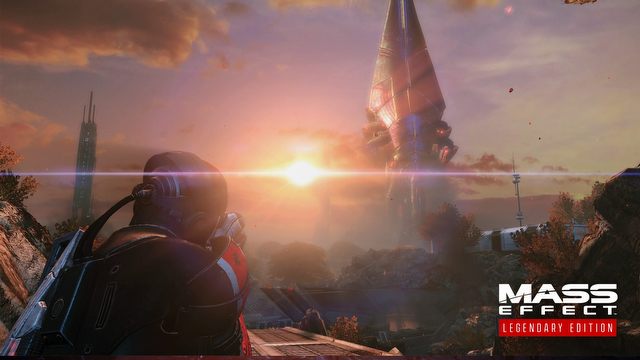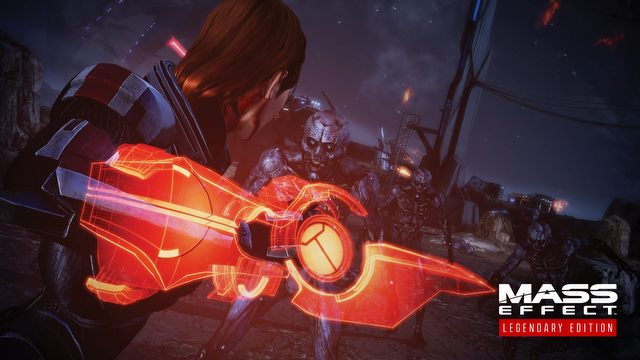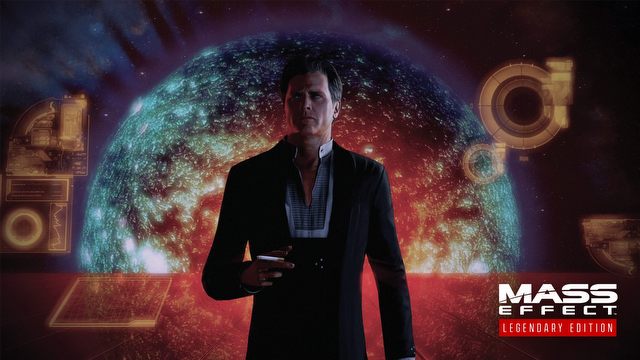Mass Effect: Legendary Edition Preview - Ultimate Reason to (Re)play Mass Effect
Mass Effect and Shepard's story is a memory of Bioware's heydays for many. We've seen snippets of the remaster, talked to the developers, and here's how they want to convince us to face the Reapers again. We also know the release date.
As a huge Mass Effect fan (Andromeda included!), I was thrilled at least twice in 2020 – first, with the announcement of the Legendary Edition, a remaster of the entire original trilogy, and then a teaser of the next installment of the series, which unfortunately won't be arriving in a long time. However, spring 2021 is inbound, and it's been named on the N7 Day as the release period for the remasters; now, Bioware finally decided to shed some light on the thing. Mass Effect Legendary Edition essentially introduces a sweeping technical overhaul (bringing in 4K, HDR or native support for 21:9, as well as higher refresh rates on PC), some gameplay improvements (mostly expected in the first game), and both minor and major changes that fans have asked for over the years.
While I didn't get a chance to play the Legendary Edition myself, I did attend an hour-long presentation outlining the various processes the original games underwent during the remastering process, and also had a brief chat with three developers, allowing me to ask them a few questions about this re-release. The developers were
Mac Walters - Project Director
Crystal McCord - Producer;
Kevin Meek - Character & Environment Director.
Why a remaster, and why now?
Until a few years ago, completing the original Mass Effect trilogy wasn't such a bad experience. Video games are constantly evolving, however. Launching these games becomes increasingly difficult over time, though there are of course some mods that improve various aspects of gameplay and visuals. However, not everyone wants to tamper with the game's files.
The developers admit they've been trying to prepare a remaster for some time, even before the release of Andromeda. The subject regularly came up during meetings, with devs and managers deliberating whether the time was already ripe. But if one were looking for a specific reason as to why it finally happened, Mac Walters admits that Casey Hudson's return to BioWare in July 2017 after a three-year separation was a – if get the pun – catalyst for the decision:
"I've been trying to think: was there any one thing, and it really wasn't. However, the one thing I think back to is Casey Hudson's return. When he came back, he was very keen on seeing where the future of the franchise would go and being able to talk to him specifically about it... – Obviously, he knew everything about the franchise and he knows how much the fans want it, how much we wanted to do it. I think that probably helped to get that initial momentum and get us over that initial starting point."
Mac Walters, Project Director
I mentioned mods, an ideal solution that allowed Mass Effect to remain visually compelling. After all, there are textures in higher resolution, or graphical enhancements available. But the reasoning was this:
There are people that mod the game but not everybody knows how to do that, right? We just want to make the game accessible to everybody as well, bring it to this generation and make it playable for anyone who might want to try it out.
Crystal McCord, Producer
There's undeniable truth to this. Mods are usually well explained, sometimes coming with convenient install wizards, but then things tend to get complicated, and once you break your game, there's often no way but reinstall. That's even more important since the fans' creations don't always have to work like a charm. Likely the biggest mod I myself have used over the years is upgrading Prince of Persia: Sands of Time to have the thing go in 21:9. Let's get back to Mass Effect, though.
Our mod community is amazing. I have no idea how they're able to do half the stuff they're able to do. At the end of the day, I think the big difference between us and the mods it is you mod at your own risk. Also, I think that playerbase-wise, it's important to be coming from the developers and getting it to the consoles, and we also have so many advantages over the mods. I get to work on the textures in their uncompressed, full-resolution starting point. And if we run through the same process that upreses it, you just get to a better endpoint when you start at the uncompressed higher resolutions. We also get to do things like shaders and re-light the levels. There might be certain ways that they're able to do that in mods, but they're far more limited than we are. You put reflections on windows, godrays – it all adds up to be far more than just upresing some textures.
Kevin Meek, Character & Environment Director
Mass Effect is all about compelling story, cherished companions, relationships we make throughout the three games, and the unique world that's genuinely riveting. There was one particular remark that I really liked in the context of the "why" question:
So what we really wanted to accomplish was just to make sure that you're able to sit there on your couch in front of your modern-day console or PC, your 4K HDR TV and really be able to experience that Trilogy again – or for the first time – without being distracted by the art.
Kevin Meek, Character & Environment Director
Not just better textures
During the presentation, the creators emphasized at every step that from the visual side, Legendary Edition is not just a texture boost, but actually quite a comprehensive upgrade – especially if the game is to be displayed at so-called ultra-high resolutions. The few screenshots included here don't let you fully appreciate the extent of changes, and what we've seen a week ago. The image showing Normandy SR1 from the original game was used to show us how much changes when you add tonemapping, volumetric lighting and fog, proper depth of field, bloom, bokeh (soft blur), subsurface-light scattering and ambient occlusion. Only then can you fully realize the extent of changes: today, we take it all for granted as industry standard.
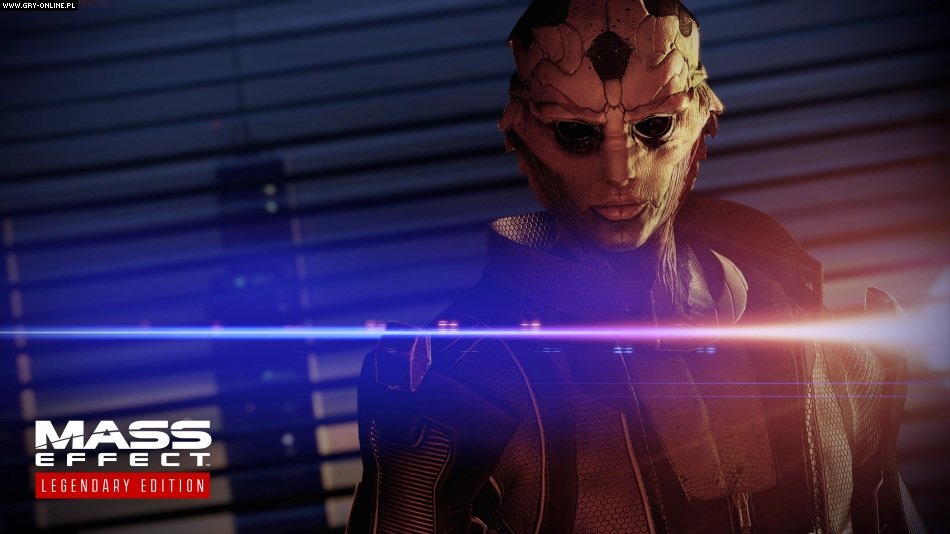
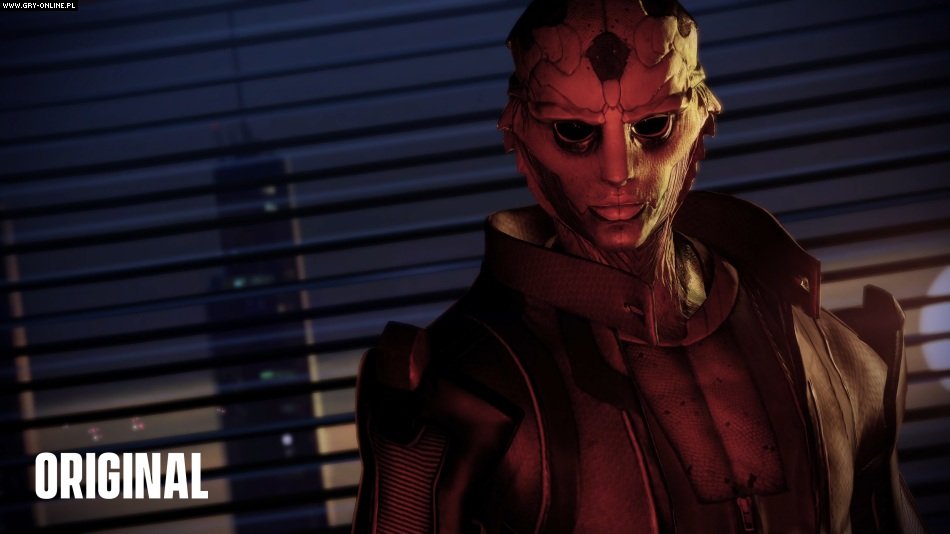
Judge for yourself.
We've also seen the process of slightly upgrading the very first location in the game – Eden Prime. Kevin said that the environment team was looking for a way to beautify the area without much interference with the location, and it quickly became apparent that the simplest solution would be... to change the position of the sun in the sky. In the original, after landing on the planet's surface, the characters were facing the camera, which encouraged turning around and looking at the horizon, but for the rest of the level, the sun played no particular role. Here, changing the position of the sun allowed, among other things, for much more interesting lighting in the grove, where Jenkins gets killed (every damn time!). The lighting, by the way, is the most striking change in all the gameplay snippets presented to us, adding a distinct character to the remaster.
It's been 14 years since the original release, and that means huge changes in hardware capability and technology it utilizes, so... Why not bring the games to Unreal Engine 4?
One of the things that we did early on, we actually talked to the people at Epic and we asked what would it look like if we brought it to Unreal 4. Very quickly it became clear that that level of jump would really change fundamentally what the Trilogy was, how it felt and how it played. For example, if you look at Kismet (it's a visual scripting language) for 3, there's no real copy-paste for that to go to Unreal 4, which means every moment, every scene, everything would have to be essentially redone from scratch.
Mac Walters, Project Director
While sticking to Unreal Engine 3 means you can't quite go wild with changes, the developers still managed to do quite a lot. The game is coming for previous-generation consoles, which are the most popular hardware platforms right now, and is aiming for 60 frames per second on Xbox One X and PS4 Pro (there's no specific information about the base versions of these consoles yet – it will definitely run, but the differences in performance between the stronger and weaker versions remains guesswork). Additionally, it was mentioned that the game will be "forward compatible," which means that it will run on current-generation and who knows – maybe there's a chance for future patches to further improve the game?
As concerns the PC, we can also count on support for higher resolutions, 21:9 aspect ratio, as well as compatibility with displays offering higher refresh rates. Fans of PC gaming with a pad should also be happy, as the game will finally support controllers.
Importantly, the developers focused on ensuring that the game offers the same graphical quality on every platform, the same changes, and visual improvements. And while it looks like the PC version will be the only one that supports 21:9 and higher refresh rates (which we'll have to check at launch, as I'm taking the above sentence rather out of context of the conversation), we won't encounter unique additional options like ray-tracing here. However, the creators were tempted by a very clever trick when it comes to reflections:
There's a whole different branch of opportunity that you actually got with Unreal 3, because it is such an old engine. It's called forward rendering instead of deferred rendering and it actually opens this opportunity for us where we can actually just render the scene twice. So what we've done through a lot of moments in Mass Effect 1, 2 and 3 is if there's a really reflective surface and the performance supports it, we can actually add like a second camera to the world and render the texture reflection on surfaces so you will see like real-time dynamic reflections as you pass. That's just another camera looking at you and capturing the scene.
Kevin Meek, Character & Environment Director
Revamping the grandpa
There's no denying that the first Mass Effect is the hardest to go back to today. Leaving the visuals aside, it's mechanically the least compelling of the three, which can definitely put new players off, and can even make the fans gnash their theeth. Not surprisingly, it was the first ME that received the most upgrades and required the most work. Since we haven't got a chance to play it, I can only discuss what the creators talked about.
Remember the biggest banes of the first part? Mako, and elevators. The game managed to sort out at least one of these things. The elevators won't be lengthy loading screens anymore: the environment will load in the background, and you will be able to skip the companions dialogue (barbarian). We saw a comparison based on the same location and theLegendary Edition allowed us to enter the Presidium after 14 seconds, while the original was still loading and the elevator only let the team out after entire 52 seconds.
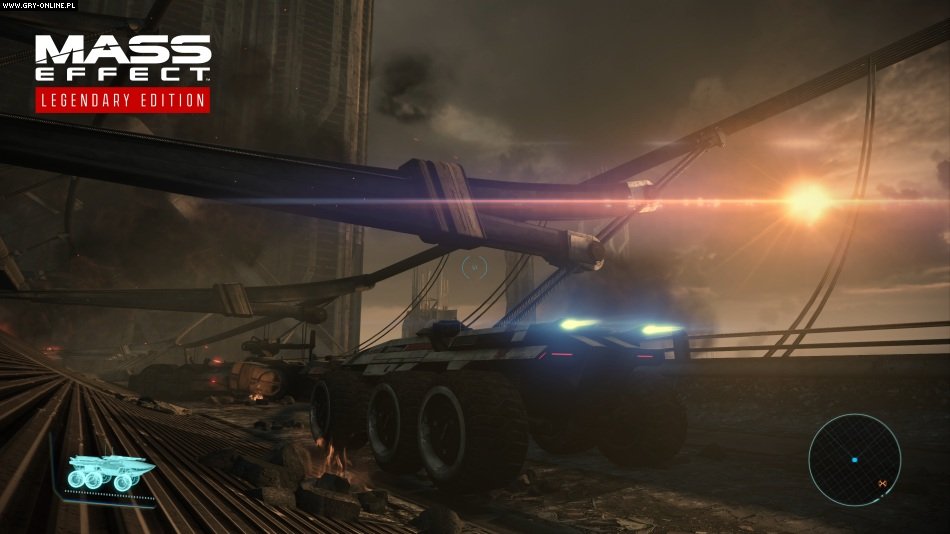
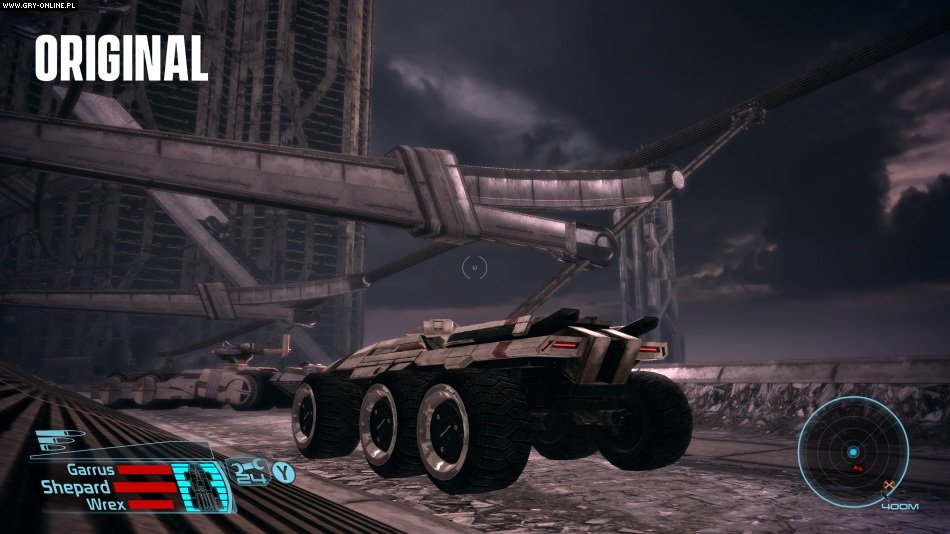
Not only is the Mako supposed to be prettier, but it's also supposed to drive better.
While the above can be considered a complete and verifiable success, the change in the way Mako is driven will only be verifiable on release. Mac Walters admitted that Mako was one of the first things the team set out to redo in terms of gameplay, and of course they set about improving the physics and all the little things that affect the vehicle's off-road behavior. A decision was also made to change the handling itself – this time, steering won't be vehicle position related, but camera-related. In simple terms – Mako should now feel more like a typical in-game vehicle. The feedback that reached the studio, said that some people liked the old system, so to reconcile both sides, it will be possible to switch between the old and new control system for the infamous vehicle. .
While not all of the improvements were discussed in detail by the developers, we still got a list hidden under the "and much more," slogan, which I'll take the liberty to enumerate in full here: Camera interpolation/smoothing, More consistent auto save points, in-scope aim smoothing, cover pass, dedicated melee button, improved enemy AI, improved squad/AI controls, minigames unified across platforms, removed class based weapon restrictions (can’t train but can use), removed class-based aim penalties, rebalanced XP for 60 level cap (New Game + not required), improved boss encounters, improved cooldown for first aid, more unified control scheme between games, reduced difficulty/frequency of minigames, modernized HUD. Quite a list!
All that glitters is not gold
There's no denying that the first game in the series was discussed the most, as a game that saw the most changes. The further into the trilogy, the less changes the game needed, and the closer it looked to what we'll get in the Legendary Edition. Of course, we'll still see the difference between Mass Effect 3 and the remaster, but it won't be as impressive.
When you compare the original and the remaster side by side, all the differences are clearly apparent, but I admit there were a few instances when I had to think pretty hard to discern which of the images was from the LE. I guess the main culprit is Unreal Engine 3, which – no matter how heavily tweaked by developers – is still rooted in how the original games were constructed. Then, the webcast was running at 1080p.
The presented materials were labelled as "work in progress," and I waas kind of taken aback by a rather poorly realized lip sync. Some of these materials, however, dated back to June last year, though, so many things have surely changed since. Hopefully this won't mean Shepard can't take the helmet off.
One of the big surprises with Mass Effect 3 was the multiplayer mode, which many people enjoyed. It might have come as a bit of a surprise to learn that there will be no multiplayer mode in the remaster, and the developers have openly addressed that:
At least at one point in time, everything was on the table. Ultimately, we looked at what it would take to do that. Obviously it presented many of challenges. You look at everything from what you do with crossplay, 'cause that's kind of an expectation now, what do we do with people who are still playing multiplayer now, how do we honor that, how do we bring them in, can we somehow bridge that gap. These are, of course, not insurmountable challenges, they're all things that we could do to fix that problem and get multiplayer in there, but when you looked at the amount of effort that it was gonna take to do that, it was easily commensurate if not greater than, for example, uplifting all of the Mass Effect 1. And I think our focus really was on the single-player experience, and at some point, we had to draw a line. (...) The overall Mass Effect: Legendary Edition is a better representation of the original Trilogy because we were able to focus on those single-player moments.
Mac Walters, Project Director
What's in the set?
Mass Effect: Legendary Edition will contain three games in one package that come in complete versions – with all DLCs, extra characters, weapon and armor packs. All games can be launched from a single launcher, although the games were not glued together and there's no smooth transition between the stages of Shepard's story. The unification of the interface, the way of presenting information in menus, and of the controls is definitely a plus, especially if someone will be getting acquainted with these games for the first time. We'll even get minor tweaks to the audio layer (like the sounds of some weapons), though don't expect a huge difference here on the level of support for Dolby Atmos or 3D Tempest Audio on the PS5.
Team FemShep should be very pleased as well, as we will finally get to use the most iconic look of Ms. Commander earlier than the third game. The developers have really polished this character, so that now, you can use the default female look right from the start, unless, of course, you want to create your own character. The wizard itself has also been expanded, adding a bit more variety.
The developers did not interfere in the story in any way, so we are getting the exactl same adventure that Bioware begun in 2007. An epic story, fleshed-out companions we actually care about, non-stop gun calibration, Martin Sheen's brilliant performance, Scientist Salarians, and all that jazz. We'll be able to experience it all again in more accessible visuals, and for those of you, who have deflected from the series because of its age – there will be no better occasion to hop aboard the Normandy with Garrus, Liara, Tali, Wrex, and all the great cast. For anyone wondering – the Extended Cut ending of Mass Effect 3 is an integral part of the Legendary Edition and is by all means considered canon.
The official release date for Mass Effect: Legendary Edition is May 14 and I, for one, can't wait. I've spent hundreds of hours with this series and I probably know all the quests inside out. I rehearsed the entire ME trilogy regularly, and playing the first was more like a visit to dentist every year (especially if you don't use mods). This release eliminates the main problem that the original games had at this point, so I wholeheartedly recommend to you the best video-game space opera ever made. And then to top it all off, watch The Expanse – it's the best TV (non-)Mass Effect you can get.
